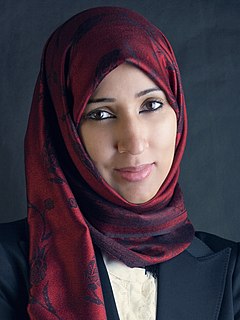A Quote by Manal al-Sharif
In May 2011, I drove a car in the city of Khobar, Saudi Arabia, to protest the kingdom's ban on women driving.
Related Quotes
If you ask a Saudi Imam why women in Saudi Arabia can't drive, he'll say, 'Because Islam demands it.' But that's absurd, because - first of all - Islam demands no such thing; and secondly, the only country in the world in which women can't drive is Saudi Arabia. The inability to understand the difference between a cultural practice and religious belief is shocking among self-described intellectuals.
Saudi Arabia has been successful in preventing Houthi missiles from causing substantial damage. Yet, the inability of Saudi authorities in preventing Houthi missiles from being fired in the first place serves as an embarrassing reminder that the kingdom's leadership is unable to restrain their Iranian-backed opponent.


































